new posts in all blogs
Viewing: Blog Posts Tagged with: “hint, Most Recent at Top [Help]
Results 1 - 20 of 20
How to use this Page
You are viewing the most recent posts tagged with the words: “hint in the JacketFlap blog reader. What is a tag? Think of a tag as a keyword or category label. Tags can both help you find posts on JacketFlap.com as well as provide an easy way for you to "remember" and classify posts for later recall. Try adding a tag yourself by clicking "Add a tag" below a post's header. Scroll down through the list of Recent Posts in the left column and click on a post title that sounds interesting. You can view all posts from a specific blog by clicking the Blog name in the right column, or you can click a 'More Posts from this Blog' link in any individual post.

From our colleagues at Signs:
The University of Chicago Press and Signs are pleased to announce the competition for the 2017 Catharine Stimpson Prize for Outstanding Feminist Scholarship. Named in honor of the founding editor of Signs: Journal of Women in Culture and Society, the Catharine Stimpson Prize is designed to recognize excellence and innovation in the work of emerging feminist scholars.
The Catharine Stimpson Prize is awarded biennially to the best paper in an international competition. Leading feminist scholars from around the globe will select the winner. The prizewinning paper will be published in Signs, and the author will be provided an honorarium of $1,000. All papers submitted for the Stimpson Prize will be considered for peer review and possible publication in Signs.
Eligibility: Feminist scholars in the early years of their careers (fewer than seven years since receipt of the terminal degree) are invited to submit papers for the Stimpson Prize. Papers may be on any topic that falls under the broad rubric of interdisciplinary feminist scholarship. Submissions must be no longer than 10,000 words (including notes and references) and must conform to the guidelines for Signs contributors.
Deadline for Submissions: March 1, 2016.
Please submit papers online at http://signs.edmgr.com. Be sure to indicate submission for consideration for the Catharine Stimpson Prize. The honorarium will be awarded upon publication of the prizewinning article.
Papers may also be submitted by post to
The Catharine Stimpson Prize Selection Committee
Signs: Journal of Women in Culture and Society
Northeastern University
360 Huntington Avenue
263 Holmes Hall
Boston, MA 02115
To visit the Signs site, click here.


As we near the end of the 2015 University Press Week blog tour, here’s a shorthand of what our fellow esteemed presses have in the works today under the umbrella, “Conversations with Authors,” in addition to all of the great posts other presses have contributed so far:
- Gary Kramer, publicist at Temple University Press, interviews Eric Tang, author of Unsettled, about his scholarly publishing experiences
- Columbia University Press editor Christine Dunbar discusses the new Columbia UP Russian Library series of literature in translation in conversation with translators and scholars from the series board
- the University of Virginia Press profiles one of their authors via an intimate Q & A
- at the Beacon Press blog, executive editor Gayatri Patnaik speaks with author Jeanne Theoharis about The Rebellious Life of Mrs. Rosa Parks and the Rosa Parks papers
- Acquisitions editor Dawn Durante interviews Carol Stabile, editor of the Feminist Media Studies series, for the University of Illinois Press
- the University of Southern Illinois Press blog features questions and answers with Guy R. Hasegawa, author of Villainous Compounds: Chemical Weapons and the Civil War
- the University of Kansas Press hosts a discussion with Friended at the Front author Lisa Silvestri
- Marketing manager Marty Brown, of Oregon State University Press, talks with author Lawrence Landis about his writing process for A School for the People: A Photographic History of Oregon State University
- A Q & A between Liverpool University Press’s editorial director and the editor of one of their forthcoming open access e-textbooks, Using Primary Sources is in the works for LUP
- And finally, the University of Toronto Press sits down with one of their journal editors.
To read more about 2015 University Press Week—and see what you might have missed—click here.

From the headquarters of the American Association of University Presses (AAUP), here comes everyone’s favorite week in November, besides that one about colonialism—just kidding, this week is, of course, de facto, the pride of November because it celebrates the prescience, diversity, and commitment to knowledge exemplified by the university press in the twenty-first century. Here’s a fine sampling of the breadth and depth offered by these presses, presented as a series of infographics, which play with the collective numbers produced by member presses from 12 nations, 41 of the United States, and 7 Canadian provinces.
From Monday, November 9th, through Friday, November 13th, in particular, you’ll be able to virtually participate in a blog tour, featuring posts from over 40 AAUP member presses. We’re up on Thursday, but in the meantime, here’s what in the horizon for the next few days:
Today, Monday, 11/9, you’ll find posts from: the University of Florida Press (on how scholarly cookbooks have changed the Sunshine State), the University Press of New England (on the serendipitous timing of their book Winning Marriage, released within days of the Supreme Court’s recent verdict), the University Press of Missouri (on their statewide partnership and collaboration to create the “Mississippi Books” page at the Clarion Ledger), the University Press of Kentucky (coming thru with some surprising facts on AAUP presses), the University of Nebraska Press (showcasing some staff profiles), the University of California Press (on new publishing platforms), the University of Wisconsin Press (on mystery fiction and scholarly publishing), and posts by both the University of Kansas and University of Michigan Presses.
Tomorrow, Tuesday, 11/10, look for posts courtesy of: Indiana University Press (from IUP director Gary Dunham), Oxford University Press (from editorial director Sophie Goldsworthy), George Mason University Press (by Mason Publishing on the future of digital tools), University Press of Colorado (on their 50th anniversary—and what’s up ahead), a second blog from the University Press of Kansas (by director Chuck Myers), University of North Carolina Press (from director John Sherer, on the necessity of financial support), West Virginia University Press (on the value of acquisitions work in the digital age), and John Hopkins University Press (with commentary from editorial director Greg Britton).
And, for general information about this week, here follows a synopsis from the AAUP website:
#ReadUP
The AAUP community uses the #ReadUP hashtag to highlight on social media the best of what UPs are publishing all year long. It beautifully captures what we celebrate when celebrate University Press Week: the scholarship, writing, and deep knowledge that is shared with the world through our books and publications.
#UPShelfie
During UP Week, post a #UPshelfie (a photo of your university press and AAUP member books) to Twitter with the tags #UPshelfie and #ReadUP for a chance to win one of five Surprise! University Press Week book bags! We’ve collected an exciting, but mysterious, group of surprising books and items from our members to share with 5 lucky UP-readers. (Don’t forget both tags—that’s how we’ll know you want to be included in the drawing!)
Two online panels featured during University Press Week:
Opening Access: The Reinvention of the Academic Press
A wide-ranging discussion of the future of the academic book, in tandem with Academic Book Week
November 10, 3PM Eastern
It’s Not Scary: The Art of Getting Published with a Scholarly Press
Get insight into the life of your future book, from proposal to publicity
Friday, November 13, 12PM Eastern
The UP Week Roundup
A bulletin of events and news for University Press Week: subscribe now!
To read more about AAUP Week and the campaign behind #readUP, click here.
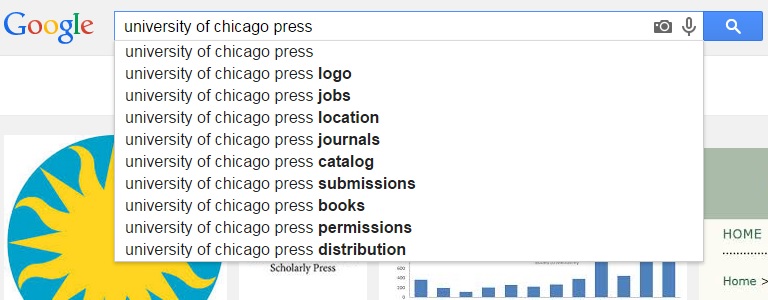
Bolder. More global. Risk-taking. The home of future stars.
Not a tagline for a well-placed index fund portfolio (thank G-d), but the crux of a piece by Sam Leith for the Guardian on the “crisis in non-fiction publishing”—ostensibly the result of copycat, smart-thinking, point-taking trade fodder that made Malcolm Gladwell not just a columnist, but a brand. As Leith asserts:
We have a flock of books arguing that the internet is either the answer to all our problems or the cause of them; we have scads of books telling us about the importance of mindfulness, or forgetfulness, or distraction, or stress. We have any number about what one recent press release called the “always topical” debate between science and religion. We have a whole subcategory that concern themselves with “what it means to be human.”
Enter the university presses. Though Leith acknowledges they’re still capable of producing academic jargon dressed-up in always already pantalettes, they are also home to deeper, more complex, and vital trade non-fiction that produces new scholarship and nuanced contributions to the world of ideas, while still targeting their offerings to the general reader. If big-house publishers produce brands, scholarly presses produce the sharp, intelligent, and individualized contributions that later (after, perhaps, some mutation and watering down by the conglomerates) establish their fields. Especially nice to see Yale, Harvard, Oxford, Princeton, Cambridge, and UCP called out for their “high-calibre, serious non-fiction of the quality and variety.”
More from the Guardian article:
In natural history and popular science, alone, for instance: Hal Whitehead and Luke Rendell’s amazing book The Cultural Lives of Whales and Dolphins or Brooke Borel’s history of the bedbug, Infested, or Caitlin O’Connell’s book on pachyderm behaviour, Elephant Don, or Christian Sardet’s gorgeous book Plankton? All are published by the University of Chicago. Beth Shapiro’s book on the science of de-extinction, How to Clone a Mammoth? Published by Princeton. In biography, Yale – who gave us Sue Prideaux’s award-winning life of Strindberg a couple of years back – have been quietly churning out the superb Jewish Lives series. Theirs is the new biography of Stalin applauded by one reviewer as “the pinnacle of scholarly knowledge on the subject”, and theirs the much-admired new life of Francis Barber, the freed slave named as Dr Johnson’s heir. Here are chewy, interesting subjects treated by writers of real authority but marketed in a popular way. The university presses are turning towards the public because with the big presses not taking these risks, the stuff’s there for the taking.
You can read more about the University of Chicago Press’s biological sciences list here. And the rest of our titles, organized by subject category, here. Follow the #ReadUP hashtag on Twitter for old and new books straddling the line between accessible scholarship and exciting nonfiction.
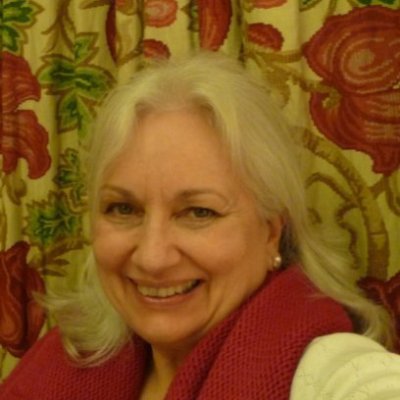
Carol Kasper, our very own marketing director, was recently honored by the Association of American University Presses (AAUP) with their 2015 Constituency Award. The Constituency Award is unique, in that it involves an open-call nomination process from one’s peers, and focuses not only on individual achievement, but also on the spirit of cooperation and collaboration that marks the measure of integrity and success within the scholarly publishing community.
From the official press release:
The Constituency Award, established in 1991, honors an individual of a member press who has demonstrated active leadership and service, not only in service to the Association but to the scholarly publishing community as a whole. In addition to a term on the Association’s Board of Directors from 2009 to 2011, Kasper has been a member of numerous committees and panels throughout the years, including the Marketing Committee, the Bias-Free Language Task Force, and Midwest Presses Meeting Committees. . . . In addition to her formal service to the Association, and her leadership in the university press and international scholarly publishing worlds, Kasper has hosted numerous Whiting/AAUP Residents over the years. One of the nominating letters added: “Carol has dedicated all this time and energy to the AAUP in her typically quiet, unassuming fashion.”
From University of Chicago Press director Garrett Kiely’s remarks at the award ceremony:
What makes Carol special and what uniquely qualifies her for this award are the people that Carol has mentored, supported, and trained in her time here in Chicago,” says Garrett Kiely, Director of University of Chicago Press and presenter of the award. “To put it in scholarly journal terms, her ‘impact factor’ has been very high!”
And just to add:
Carol is a phenomenal teacher and mentor—the very best kind, in that the generosity she extends to her colleagues, the fierce integrity with which she makes things happen, the self-determination and cooperation she encourages, and the good humor she doles out all seem effortless, because they are so very much a part of her. Congrats, CK!
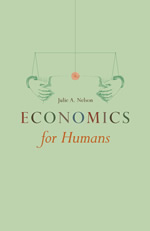
More about Economics for Humans, our free e-book for March:
At its core, an economy is about providing goods and services for human well-being. But many economists and critics preach that an economy is something far different: a cold and heartless system that operates outside of human control. In this impassioned and perceptive work, Julie A. Nelson asks a compelling question: If our economic world is something that we as humans create, aren’t ethics and human relationships—dimensions of a full and rich life—intrinsically part of the picture? Is it possible to take this thing we call economics and give it a body and a soul?
Economics for Humans argues against the well-ingrained notion that economics is immune to moral values and distant from human relationships. Here, Nelson locates the impediment to envisioning a more considerate economic world in an assumption that is shared by both neoliberals and the political left. Despite their seemingly insurmountable differences, Nelson notes that they both make use of the metaphor, first proposed by Adam Smith, that the economy is a machine. This pervasive idea, Nelson argues, has blinded us to the qualities that make us work and care for one another—qualities that also make businesses thrive and markets grow. We can wed our interest in money with our justifiable concerns about ethics and social well-being. And we can do so if we recognize that an economy is not a machine, but a living, beating heart that circulates blood to all parts of the body while also serving as an emblem of compassion and care.
Download your copy here.

After this Sunday, October 13, Hyde Park will never be the same. Jack Cella, the general manager of the Seminary Co-op Bookstore for the past 43 years, will retire after helping the store transform from a locally centered cooperative to the nation’s premier scholarly bookstore, with more 50,000 members and three locations. It would be nearly impossible to exaggerate the depth and breadth of Cella’s contribution to the culture of scholarly publishing and to this remarkable institution, and in turn, his value to the Hyde Park community, and especially to the University of Chicago Press.
From our promotions director Levi Stahl:
Being a regular at a bookstore is one of life’s great pleasures. And what you want above all—your reward for being a regular—is good company: you go to the store to talk with the people there, to find out what they’ve been doing and seeing (and of course reading), to hear what they’ve spotted that they think you might like, to catch up on the flood of new books you’d otherwise miss.
What you want is to talk to Jack Cella. It’s almost impossible to leave a conversation with Jack—quiet, understated, serious, friendly Jack—without a new book if not in hand then at least in mind. His awareness is astonishing: he doesn’t just separate the wheat from the chaff, he goes on to parcel it out perfectly to the people he knows will appreciate it most. Retirement suits readers, and no one would begrudge Jack his, but he’ll be greatly missed. Just as there’s no store quite like the Seminary Co-op, there’s no bookseller quite like Jack.
Similarly, its no understatement to quote UCP author Bruce Lincoln, who said of Cella, “He’s built the best bookstore in the U.S. and maybe beyond. He’s a treasure, and his institution is a treasure. I hope it will thrive without him, though it’s hard to imagine it without him.”
Cella certainly has impacted numerous lives through his endeavor, and Rodney Powell, editor of our film and cinema studies list, is one of them. As manager at 57th St. Books for nearly a decade, Powell wrote a send-off worthy of the man whose “vast storehouse of knowledge have come to symbolize the culture of the Co-op and what members value most about it.” It follows after the jump.
***
Yes, there they were, in the e-mail of October 1 from the Board of the Seminary Co-op: words that I had not expected to see in my lifetime: “Now that the Co-op is settled into its wonderful new space, Jack will be leaving on October 13.”
Jack leaving? When I had expected him to outlive me and pass away at his desk while checking out the information for a special order? Say it isn’t so!
Well, hardcore fans of the Seminary Co-op will have to accept the fact, and even though we know the Co-op will continue in all its eminence in its “wonderful new space,” we know it won’t be the same without Jack.
And of course it could not be— institutions change as personnel change. But it’s hard not to wax sentimental about Jack. Although he would be the first to downplay his own contribution, we also know—not to take away anything from the many others who have contributed to the Co-op’s success—that Jack has been its principal architect. Certainly that success could only be achieved in a community that loves books and shows its love by supporting such a bookstore. But without Jack’s unwavering commitment to making the Co-op one of the world’s best, it wouldn’t have happened.
However, to avoid the sentimental, I want to emphasize something other than Jack’s almost legendary modesty—his steely resolve to get things done despite seemingly insurmountable obstacles. I have some first-hand knowledge of that resolve because I was the manager of 57th St. Books when it opened in 1983 (and for about a dozen years thereafter); I was in on both the planning and working out of the plans for that enterprise, as well as the day-to-day operations that make or break any business.
So Jack was my boss—and in his own quiet way quite a tough cookie. That is, you didn’t want to disappoint him, to not do what he expected. And, of course, since he worked more than anybody else, whining about too much to do wouldn’t go very far, even if sympathy was expressed.
As I reflect on this quality after all these years, it seems to me analogous to the ruthlessness that artists must have about doing their work—you get it done, period. Think about the conclusion of Stephen Sondheim’s great song from Sunday in the Park with George, “Finishing the Hat”:
That however you live,
There’s a part of you always standing by,
Mapping out the sky,
Finishing a hat…
Starting on a hat…
Finishing a hat…
Look I made a hat…
Where there never was a hat.
Thank you, Jack, for making the hat that has served not only Hyde Park, but also a community of readers and scholars around the world, so well for so many years. Your will and work made it possible. Our best thanks for your efforts will be to treasure and maintain this remarkable institution, difficult as that will be after you leave.
Ave atque vale!

To catch the wave of year-end lists and Best of the Best citations, we thought to extend our reach beyond the books we publish here at the Press, and ask some of our scholarly tastemakers the works they’d endorse as most praiseworthy in 2012. Not every pick is new and you’ll see some selections here that may not flit across the landscape of other favorites lists—but we’ll be posting the books that made our radar blink all week long, with salutations to the authors, ideas, and publishers (large and small) that keep us coming back for more.
***
Today, we’re off and running with picks from Carol Fisher Saller, our assistant managing editor of manuscript editing at the Press, author of The Subversive Copy Editor: Advice from Chicago (Or, How to Negotiate Good Relationships with Your Writers, Your Colleagues, and Yourself), and editor of The Chicago Manual of Style Online’s Q & A + Rodney Powell, our assistant editor acquiring in film and cinema studies and all-around movie guru:
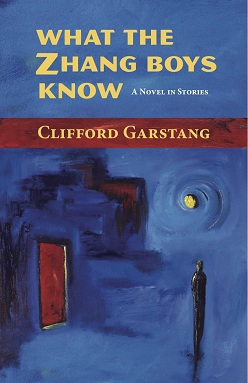 What the Zhang Boys Know, by Clifford Garstang (Press 53, 2012), is a tender look at the residents of the Nanking Mansions condos in the unevenly gentrifying Chinatown of Washington, DC. The boys are the small children of a recent widower, Zhang Feng-qi, and what they don’t know is equally to the point, as the novel’s interwoven short stories take us behind the condo doors of Feng-qi, a gay couple and their little dogs, a sculptor, a desperate and penniless young woman, and others, both to see what the other residents can’t and to view developments through yet another individual’s eyes. Garstang’s forte is the short story—most of these first appeared in literary journals—and this is his second novel in stories. His first, In an Uncharted Country (Press 53, 2009), is every bit as affecting. —Carol Fisher Saller
What the Zhang Boys Know, by Clifford Garstang (Press 53, 2012), is a tender look at the residents of the Nanking Mansions condos in the unevenly gentrifying Chinatown of Washington, DC. The boys are the small children of a recent widower, Zhang Feng-qi, and what they don’t know is equally to the point, as the novel’s interwoven short stories take us behind the condo doors of Feng-qi, a gay couple and their little dogs, a sculptor, a desperate and penniless young woman, and others, both to see what the other residents can’t and to view developments through yet another individual’s eyes. Garstang’s forte is the short story—most of these first appeared in literary journals—and this is his second novel in stories. His first, In an Uncharted Country (Press 53, 2009), is every bit as affecting. —Carol Fisher Saller
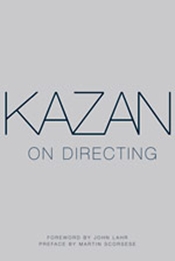 I like to circle around subjects over an extended period of time, so it’s not surprising that my favorite book of 2012, Kazan on Directing, was first published in 2009 (the centenary of Kazan’s birth). It includes excerpts from his notebooks, personal journals, and correspondence, as well as other texts, both published and unpublished—a fascinating combination of detailed comments about individual projects and general ruminations about the art of directing for both stage and screen. Go to the chapter on Death of a Salesman (Kazan’s favorite among all the plays he directed) and be engrossed by his analysis of that great work, taken from a notebook entry and script notes. Then go on to a letter he wrote to the four principal actors several months into the run after he attended a performance and found them coasting. I think you’ll be hooked, and ready to investigate the fascinating relationship with Tennessee Williams on four plays and two films—and I haven’t even mentioned the memorable collaborations with Marlon Brando from A Streetcar Named Desire to On the Waterfront. Elia Kazan, whatever his failings, was a major American artist, and Kazan on Directing helps us understand why that is so. —Rodney Powell
I like to circle around subjects over an extended period of time, so it’s not surprising that my favorite book of 2012, Kazan on Directing, was first published in 2009 (the centenary of Kazan’s birth). It includes excerpts from his notebooks, personal journals, and correspondence, as well as other texts, both published and unpublished—a fascinating combination of detailed comments about individual projects and general ruminations about the art of directing for both stage and screen. Go to the chapter on Death of a Salesman (Kazan’s favorite among all the plays he directed) and be engrossed by his analysis of that great work, taken from a notebook entry and script notes. Then go on to a letter he wrote to the four principal actors several months into the run after he attended a performance and found them coasting. I think you’ll be hooked, and ready to investigate the fascinating relationship with Tennessee Williams on four plays and two films—and I haven’t even mentioned the memorable collaborations with Marlon Brando from A Streetcar Named Desire to On the Waterfront. Elia Kazan, whatever his failings, was a major American artist, and Kazan on Directing helps us understand why that is so. —Rodney Powell
Cheers to holiday reading—stay tuned for more!
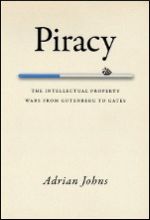 Adrian Johns is having a pretty good series of weeks. Earlier this month, the intellectual property specialist was named a 2012 Guggenheim Fellow. The chair of the Committee on Conceptual and Historical Studies of Science and the Allan Grant Maclear Professor in History at the University of Chicago, Johns plans to use his Guggenheim funding to study the intellectual property defense industry.
Adrian Johns is having a pretty good series of weeks. Earlier this month, the intellectual property specialist was named a 2012 Guggenheim Fellow. The chair of the Committee on Conceptual and Historical Studies of Science and the Allan Grant Maclear Professor in History at the University of Chicago, Johns plans to use his Guggenheim funding to study the intellectual property defense industry.
Johns is no stranger to prizes. His earlier work The Nature of the Book: Print and Knowledge in the Making won the Leo Gershoy Award of the American Historical Association, the John Ben Snow Prize of the North American Conference on British Studies, the Louis Gottschalk Prize of the American Society for Eighteenth-Century Studies, and the SHARP Prize for the best work on the history of authorship, reading and publishing. Piracy: The Intellectual Property Wars from Gutenberg to Gates, his most recent volume, won the American Society for Information Science and Technology’s Book of the Year Award and was a CHOICE Outstanding Academic Title.
Just yesterday, Johns was feted in a ceremony bestowing yet another honor on his work with Piracy, the Gordon J. Laing Prize for best faculty author, editor or translator of a book published in the previous three years that brings the University of Chicago Press the greatest distinction.
A review published in the London Review of Books finesses Johns’ redress of the vitally linked histories of piracy and printed matter:
In Adrian Johns’s account, intellectual property rights have always been precarious. According to him, the concepts of intellectual property and intellectual piracy arose as delayed responses to the advent of printing and the development of a commercial book trade, around the year 1660, in London. ‘To find the origins of intellectual piracy,’ he writes,
stand at the main door of St Paul’s Cathedral. Facing west, walk away from the Cathedral, heading down Ludgate and toward Fleet Street. After about a hundred yards you come upon a narrow alley … Entering the alley, the din of the traffic quickly fades, and you find yourself in a small courtyard. A doorway at the far corner leads into a building of indeterminate age with a stone façade. You pass along a brief, twisting entranceway and into an elegant antechamber. But then the passage suddenly and dramatically opens out, leading into a vast, formal hall. It is richly decorated with 17th-century panelling and arrayed flags, all illuminated by stained-glass windows portraying Caxton, Shakespeare, Cranmer and Tyndale. You are in Stationers’ Hall, the centre of London’s old book trade. And here, beyond all the elegant joinery and ceremonial paraphernalia, lies the key to the emergence of piracy. It sits quietly in a modest muniments room. It is a book.
Piracy posits the phenomenon at the center of our attempts to reconcile creativity and commerce—and much of Johns’ work seeks to understand this as part of the nature of print culture.
Something tells us he must be on to something. Or maybe we’re just looking for innovative intellectuals whose smiles light up a room:
 For the second year in a row, a former Phoenix Poet has taken home the Poetry Foundation’s Ruth Lilly Poetry Prize—and, for W. S. Di Piero, the legacy is a long, tall glass of water. He joins the company of twenty-six fellow poets who have soldered the experience of working class lives into indomitable verse, like Philip Levine; those who, like C. K. Williams and Adrienne Rich, have championed social issues and countered injustice; and those, like John Ashbery, who also deal in the criticism of the visual arts.
For the second year in a row, a former Phoenix Poet has taken home the Poetry Foundation’s Ruth Lilly Poetry Prize—and, for W. S. Di Piero, the legacy is a long, tall glass of water. He joins the company of twenty-six fellow poets who have soldered the experience of working class lives into indomitable verse, like Philip Levine; those who, like C. K. Williams and Adrienne Rich, have championed social issues and countered injustice; and those, like John Ashbery, who also deal in the criticism of the visual arts.
What makes Di Piero unique, in a body of work conjures the presence of divinity in everyday life, redresses the grievances of a working-class South Philadelphia upbringing, and moves with effortless comfort from plain-style speech to bold translations from Euripides and Giacomo Leopardi, is exactly what doesn’t. He tells the truth, and I think it’s fair to say, it’s not slant. Di Piero questions poets and the quotidian equally, and what he arrives at is often something close to a sense of permission.
As Christian Wiman, editor of Poetry magazine stated the Foundation’s official announcement:
“R. P. Blackmur once said that great poetry ‘adds to the stock of available reality,’ and that’s certainly true of W. S. Di Piero’s work. He wakes up the language, and in doing so wakes up his readers, whose lives are suddenly sharper and larger than they were before. He’s a great poet whose work is just beginning to get the wide audience it deserves.”
In 1992, we published Di Piero’s fifth collection The Restorers, as part of the Phoenix Poets series. In one of the book’s opening poems, “The Early Part of the Day,” Di Piero evokes the persons who inhabit a morning, with his trademark plain speak:
“They take their daily exercise walking the street/down from the rehab center, past my house,/unrighteous, ignoring the sluice of cars/schoolkids on bikes/buses heaving people/from the cinderblock slum two blocks beyond the center/to gardens, pools, and kitchens one suburb away.”

Born in 1945 in Philadelphia, W. S. Piero has authored ten books of poetry, including, most recently in 2011, Nitro Nights, as well as five essay collections. Professor Emeritus of English at Stanford University, Di Piero writes a regular column on the visual arts for the independent newsweekly the San Diego Reader and contributes regularly to The Threepenny Review. His poetry and translations have been published widely, including in The New Yorker, Poetry, Ploughshares, The American Poetry Review, and Agni, and his essays and reviews have appeared in the New York Times Book Review, the New Republic, the American Scholar, Commonweal, Bookforum, and elsewhere. The recipient of fellowships from the Guggenheim Foundation and the National Endowment for the Arts, he won the California Book Award in Poetry for Chinese Apples: New and Select

By: Kristi McGuire,
on 4/13/2012
Blog:
The Chicago Blog
(
Login to Add to MyJacketFlap)
JacketFlap tags:
Art and Architecture,
History and Philosophy of Science,
Politics and Current Events,
Medieval and Renaissance,
Awards,
History,
Poetry,
Literature,
Fiction,
Economics,
Sociology,
Books for the News,
Anthropology,
Gay and Lesbian,
UCP News,
Add a tag
The 2012 class of Guggenheim Fellows was announced this week by the John Simon Guggenheim Memorial Foundation, inciting some exuberant responses on the part of several winners (check out Terry Teachout’s Twitter feed). The Guggenheim has long been hailed as the “mid-career award,” honoring scholars, scientists, poets, artists, and writers, who have likely published a book or three, professed a fair amount of research, and are actively engaged in projects of significant scope. The fellowship possesses some tortured origins—(John) Simon Guggenheim, who served as president of the American Smelting and Refining Company and Republican senator from Colorado, seeded the award (1925) following the death of this son John (1922) from mastoiditis (Guggenheim’s second son George later committed suicide, and more infamously his older brother Benjamin went down with the Titanic). Among this year’s crop (we dare say more forward-leaning than previous years?) is a roster of standout “professionals who have demonstrated exceptional ability by publishing a significant body of work in the fields of natural sciences, social sciences, humanities, and the creative arts,” affiliated with the University of Chicago Press: Creative Arts Christian Wiman, editor of Poetry magazine and author of three poetry collections, coeditor of The Open Door: [...]
The University of Chicago Press, along with the publishing world, has lost a lion in the death, at the age of eighty-five, of Morris Philipson, who served as Director of the Press from 1967 to 2000. During his tenure—the longest of any director in the Press's 119-year history—he raised the bar in academic publishing to unprecedented heights, promoting the intellectual revolutions in culture, scholarship, and the arts that characterized this dramatic period.
His remarkable judgment and taste earned him a reputation for making bold choices that resulted in pioneering works that defined their fields. This vision was exemplified by such monumental projects as The Works of Giuseppe Verdi, The Lisle Letters, and Yves Bonnefoy's Mythologies. Other outstanding publications included John Boswell's Christianity, Social Tolerance, and Homosexuality, a 1980 American Book Award winner that broke new ground in gender studies; several editions of the Chicago Manual of Style, the definitive reference for any writer; and Norman Maclean's best-selling A River Runs Through It. Philipson was also an innovator in paperback publishing, expanding the Press's commitment to reissuing classic works by provocative writers including André Malraux, Isak Dinesen, Anthony Powell, and Paul Scott.
Philipson took great pride in establishing the Press as one of America's leading publishers of translations, forging fruitful partnerships with French and German publishers in particular. Philipson and his editors introduced to an American audience works by Jacques Derrida, Paul Ricoeur, Claude Lévi-Strauss, and Thomas Bernhard, among others. A translation of essays and letters by the German publisher Kurt Wolff, who as an émigré founded Pantheon Books, was for Philipson "an occasion to make conscious the fact that the character of a press is determined by the publisher making selections on the basis of his conceptions of art and serious thought," he told Publishers Weekly in 1991.
In recognition of his extraordinary contributions, in 1984, the French government awarded Philipson the Commandeur de L'Ordre des Arts et des Lettres for his service to French letters, and in 1982 he became the first director of a scholarly press to win PEN American Center's Publisher Citation. Shortly before retiring in 2000 Philipson also received the Association of American Publishers' Curtis Benjamin Award for Creative Publishing.
Philipson was born in New Haven, Connecticut, and received his BA (1949) and MA (1952) from the University of Chicago. Abroad, he pursued studies at the Sorbonne and as a Fulbright scholar at the University of Munich. He received a PhD in philosophy from Columbia University where, under the mentorship of Jacques Barzun, he concentrated on aesthetics. As an advocate for the pursuit of "the best that has been said and thought in the world," he inspired the next generation by teaching courses in philosophy, cultural history, and literature at the Julliard School of Music, Hunter College, and the University of Chicago. Before returning to his alma mater to assume the directorship, he established his distinctive editorial style at Random House, Alfred A. Knopf, and Basic Books during the golden age of New York publishing.
His passion for publishing was reflected not only in recognizing the potential in other authors, but in realizing his own literary aspirations. He was the author of five acclaimed novels—Bourgeois Anonymous (Vanguard, 1965), The Wallpaper Fox (Charles Scribner's Sons, 1976), A Man in Charge (Simon & Schuster, 1979), Secret Understandings (Simon & Schuster, 1983), and Somebody Else's Life (Harper & Row, 1987)—as well as short stories and works of nonfiction. Cynthia Ozick praised his work as comprising "lucid and engagi

This past Friday, the University of Chicago community mourned the loss of one of its brightest stars, when Miriam Bratu Hansen lost her decade-long battle with cancer. The Ferdinand Schevill Distinguished Service Professor in the Humanities; professor in the Departments of Cinema & Media Studies and English, and at the College; founder of the Film Studies Center; and a faculty board member of the University of Chicago Press (1991-96), Hansen shifted the confines of cinema studies to account for modernism's more vernacular forms in line with the writings of Siegfried Kracauer, Walter Benjamin, and others from the Frankfurt school, as Hansen's colleague Tom Gunning describes in his moving tribute:
Coming to the United States, she worked at the Whitney Humanity Center at Yale and taught at Rutgers University before coming to Chicago in 1990. Her research moved to the history of early American cinema and to the work of the Frankfurt school and its satellites on cinema. Both of these areas were evident in her book Babel and Babylon: Spectatorship in American Silent Cinema published in 1991, a work which gave shape to the research that had been emerging in the eighties on early American cinema, seeing it through the lens of Negt and Kluge's concept of the public sphere, and providing a magisterial analysis of D. W. Griffith's 1916 film Intolerance through the criticism of Walter Benjamin, and new work on gender.
Hansen was able to work out an intersection between film history, film analysis and film theory few have ever matched. Her boundless curiosity marked her teaching and writing in the next decade, as she evolved the concept of the "vernacular modernism" through probing the influence of Hollywood on early Asian (especially Chinese) cinema, working with her student Zhen Zhang, and especially extending her research into the Frankfurt school and cinema, producing a series of crucial essays and finishing shortly before her death a large manuscript on cinema and the Frankfurt school.
Tributes to Hansen online can be found at Film Studies for Free (including a compendium of her work available on the web), Category D: A Film and Media Studies Blog, Cintetrix, and 3 Quarks Daily. Many will remember her for her vitality, patience, and uncompromising intellect. I'm one of them.
Memorial contributions may be made to the Miriam Hansen Fellowship Fund at the University of Chicago, 5801 S. Ellis Ave., Chicago, IL 60637.
Miriam Hansen on Post-Medial Culture from Film Studies Center on Vimeo.
On the Chicago blog, we usually stick to news of our books and authors—that, after all, is what a publisher's blog is for. Today, however, we'd like to break from that for a moment to offer thanks and good wishes to the colleague who has been an eloquent voice on this blog for the past few years, Stephanie Hlywak.
Stephanie is leaving us today after seven years, and she'll be missed, perhaps nowhere more than in this very space, where her inventiveness, eye for a story, and ready wit have been responsible for giving the Chicago blog much of its panache. We wish her the best of luck as she takes up a job at the Poetry Foundation, where she'll continue the good work of promoting books and literature to the world at large.
At times like these, people have turned for centuries to the Ancients, and we would be remiss if we did any less. So as we wave goodbye, we'll let Seneca have the floor, in an excerpt from a letter of advice to young Nero Caesar, as translated by Robert A. Kaster in our new volume, Anger, Mercy, Revenge:
You can boldly make this declaration, Caesar: all that has been entrusted to your faithful guardianship is kept safe, and you have detracted not a jot from the commonwealth by force or by stealth. . . . That unique goodness of yours does not go for naught, nor has it encountered ungrateful or malicious judges: gratitude is given you in return, and no one person has even been as dear to another individual as you are dear to the Roman people, its great and lasting good.
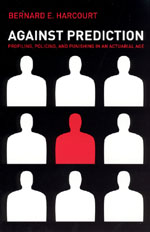 Since 1963, the Press has awarded the annual Gordon J. Laing Prize to the Chicago faculty author, editor, or translator whose book has brought the greatest distinction to the Press's list. This year, at a ceremony held earlier this month, the prize honored Bernard Harcourt, the Julius Kreeger Professor of Law and Professor in Political Science, for his book Against Prediction: Profiling, Policing and Punishing in the Actuarial Age.
Since 1963, the Press has awarded the annual Gordon J. Laing Prize to the Chicago faculty author, editor, or translator whose book has brought the greatest distinction to the Press's list. This year, at a ceremony held earlier this month, the prize honored Bernard Harcourt, the Julius Kreeger Professor of Law and Professor in Political Science, for his book Against Prediction: Profiling, Policing and Punishing in the Actuarial Age.
Harcourt's book challenges the growing use of actuarial methods—from random security checks at airports to the use of risk assessment in sentencing—to determine whom law enforcement officials target and punish. The widely perceived success of these methods, he argues, has begun to distort our very conception of just punishment and to obscure alternate visions of social order. You can listen to Harcourt discuss his arguments in greater detail during this podcast of a talk he gave for the Chicago's Best Ideas series at the University of Chicago Law School.
As the new Chicago Chronicle notes today, Harcourt said of the prize itself that it was "extremely rewarding—and also very humbling—to receive this recognition from the community of scholars who I admire the most. A community that values ideas so intensely and places critical thought above all else."
Harcourt's own contributions to this community have been great, and we are proud to have been part of two of them, including Against Prediction and his previous The Language of the Gun. Perhaps Malcolm Gladwell put it best: "Bernard Harcourt has never had an uninteresting thought, or made an argument that does not provoke or engage or delight or enlighten—or do all of those things simultaneously."

Nigel Beale, author of the Nota Bene Books blog, recently posted the audio from an interesting interview he conducted with the press's publicity manager, Levi Stahl. The interview offers a rare insider's perspective on book marketing and publicity, touching on everything from coordinating book tours and dealing with the media, to writing promotional copy, to the industry's shift towards online marketing strategies. The pair top off the interview with a discussion of Stahl's recent efforts in getting the UCP to re-issue the Parker novels, Richard Stark's famous hardboiled noir mystery series. Listen in on the discussion at Nigel Beale's Nota Bene Books blog.
Judging for the 2009 American Association of University Press's Book, Jacket and Journal Show—a competition that recognizes meritorious achievement in the design, production, and manufacture of books, jackets, and journals by members of the university press community—took place last month at the AAUP Office in New York City. Approximately 289 books, 292 jacket and covers, and 7 journals competed, and 53 books, 36 jackets/covers, and one journal were chosen by the jurors as the very best examples from this pool of excellent design.
The University of Chicago Press is proud to announce that it had eleven winning entries in the show. Congratulations to the winners!
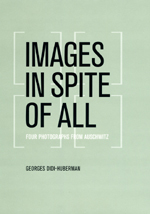
Design Category: Scholarly Typographic
Images in Spite of All: Four Photographs from Auschwitz by Georges Didi-Huberman
Designer: Maia Wright
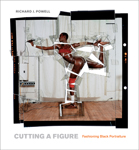
Design Category: Scholarly Illustrated
Cutting a Figure:Fashioning Black Portraiture by Richard J. Powell
Designer: Matt Avery
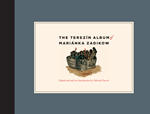 Design Category: Scholarly Illustrated
Design Category: Scholarly Illustrated
The Terezín Album of Mariánka Zadikow Annotated by Debórah Dwork
Designer: Jill Simabukuro

Design Category: Trade Typographic
Collections of Nothing by William Davies King
Designer: Jill Shimabukuro

Design Category: Trade Illustrated
The Chicagoan: A Lost Magazine of the Jazz Age by Neil Harris
Designer: Maia Wright

Design Category: Trade Illustrated
Sleeping Beauty: A One-Artist Dictionary by John Sparagana and Mieke Bal
Designer: Jill Shimabukuro
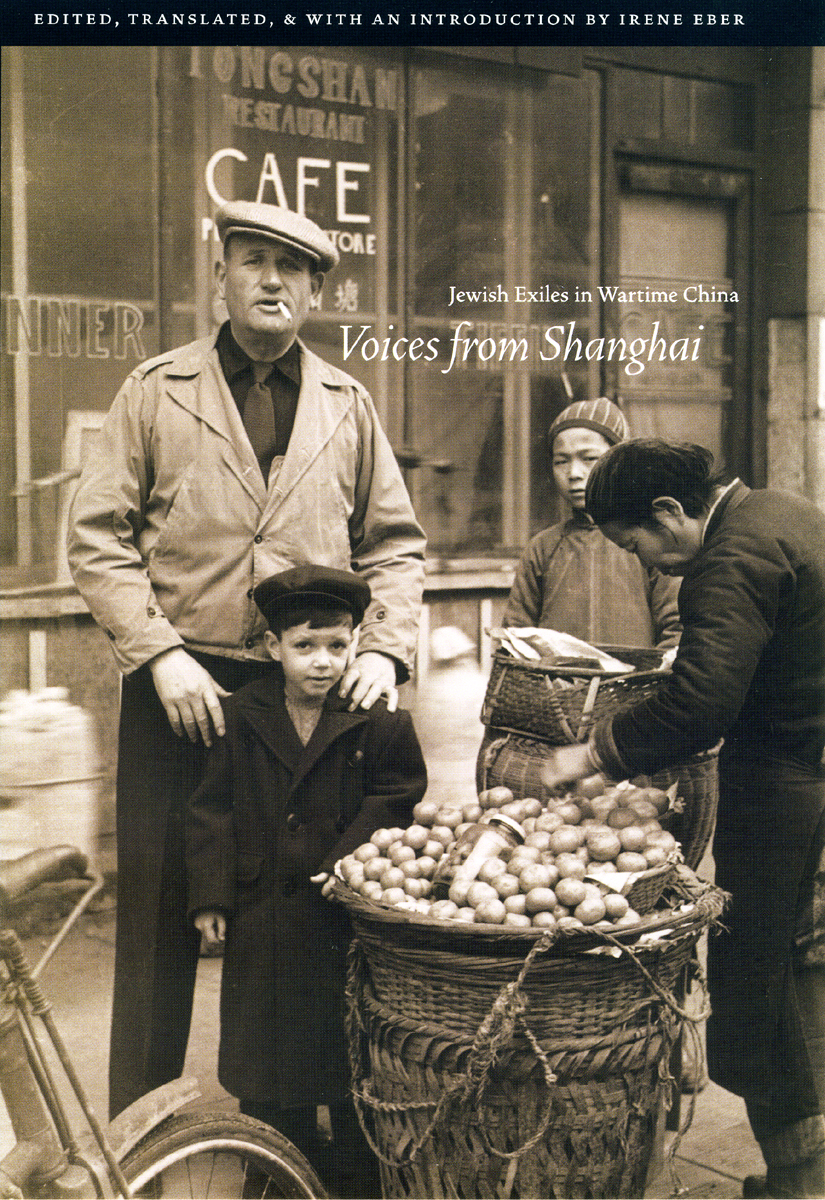
Design Category: Poetry and Literature
Voices from Shanghai: Jewish Exiles in Wartime China Edited by Irene Eber
Designer: Matt Avery

Design Category: Jackets and Covers
Abraham Lincoln in the Post-Heroic Era: History and Memory in Late Twentieth-Century America by Barry Schwartz
Designer/Art Director: Matt Avery
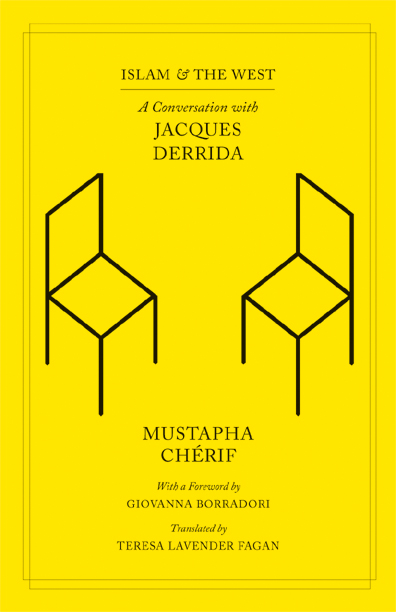
Design Category: Jackets and Covers
Islam and the West: A Conversation with Jacques Derrida by Mustapha Chérif
Designer: Dustin Kilgore, Art Director: Jill Shimabukuro
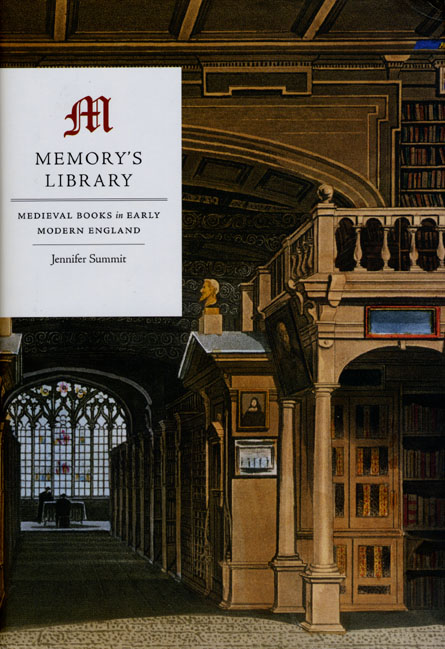
Design Category: Jackets and Covers
Memory's Library: Medieval Books in Early Modern England by Jennifer Summit
Designer: Natalie F. Smith, Art Director: Jill Shimabukuro
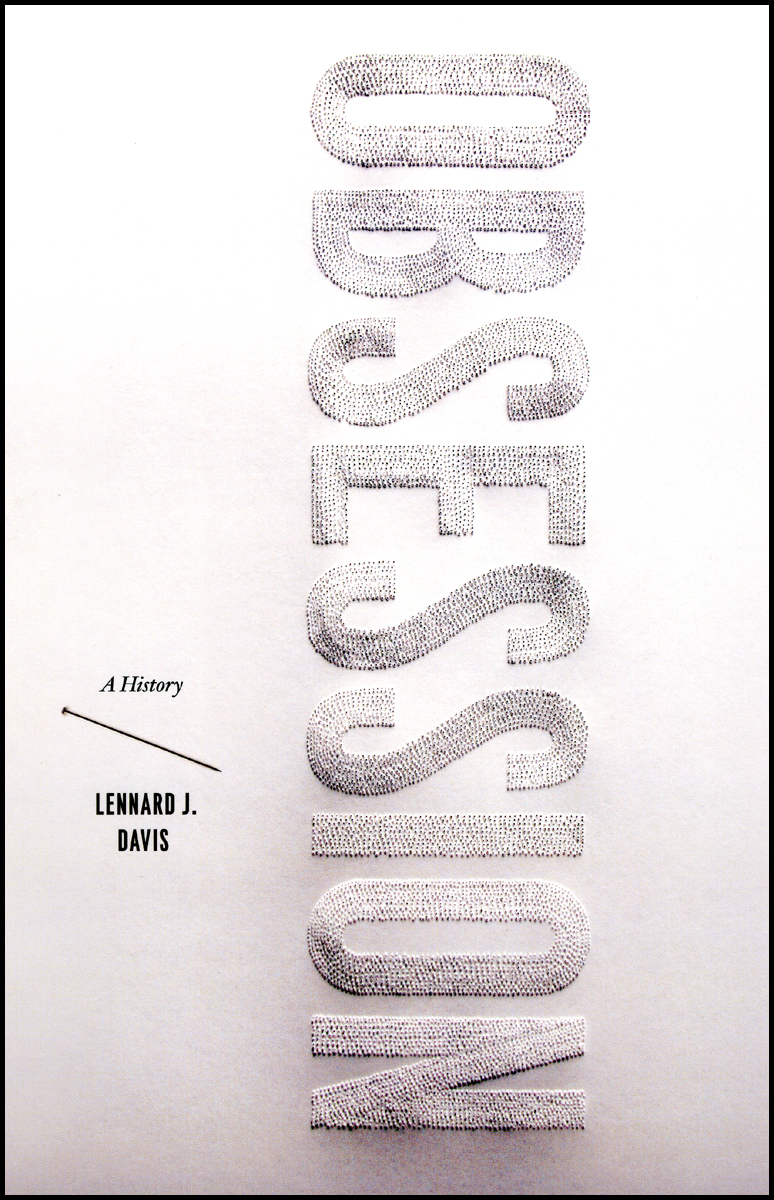
Design Category: Jackets and Covers
Obsession: A History by Lennard J. Davis
Designers: Isaac Tobin and Lauren Nassef, Art Director: Jill Shimabukuro
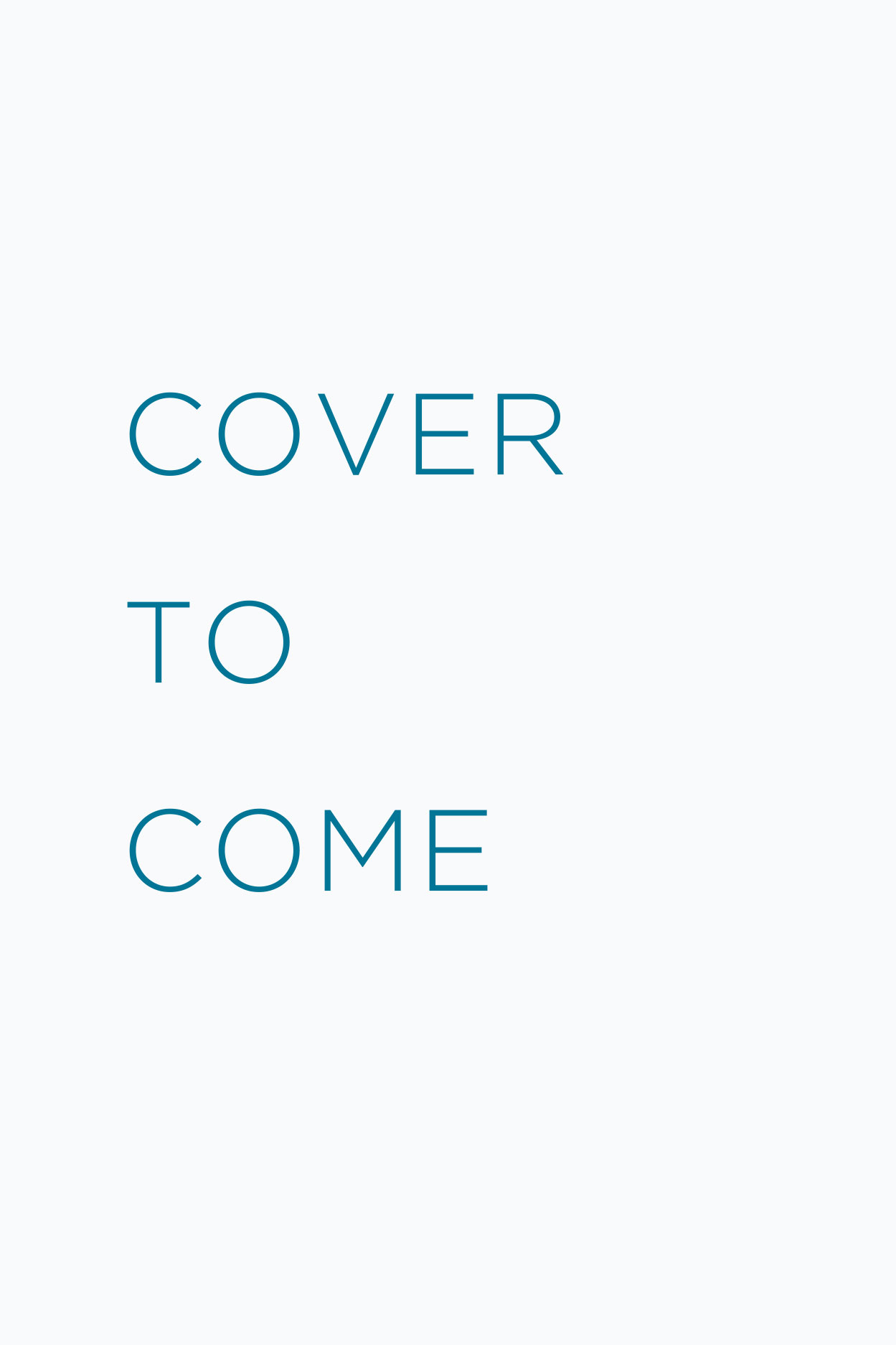 We now do mp3. Chicago Audio Works is our new Press podcast, currently featuring interviews of our authors and certain to include archival audio, author readings, and other items of aural interest as we go along.
We now do mp3. Chicago Audio Works is our new Press podcast, currently featuring interviews of our authors and certain to include archival audio, author readings, and other items of aural interest as we go along.
Episode 1 is an interview with William Graebner, author of Patty's Got a Gun: Patricia Hearst in 1970s America. Graebner takes us back to that queasy decade of the '70s, an unstable age when an heiress could become an weapon-wielding revolutionary—and back again—in a matter of months.
Graebner is interviewed by Gordon Buffonge. Chicago Audio Works is produced by Chris Gondek of Heron & Crane and the Invisible Hand. Episodes of Chicago Audio Works are available from iTunes and other digital media aggregators.
 Along with nearly every other facet of life, in the last decade the digital revolution has transformed the book publishing industry. As North America's largest university press, Chicago has been one of the leaders in advancing the use of digital technology in publishing—a fact acknowledged in the cover story of this month's Book Business magazine. Touching on everything from our short-run digital printing program, to the digital publishing services offered by BiblioVault, our digital content repository, Book Business's James Sturdivant talks to UCP director Garrett Kiely and Chicago Digital Distribution Center manager Jeanne Weinkle to learn how Chicago has extended its digital publishing initiatives into the twenty-first century. James Sturdivant writes for Book Business:
Along with nearly every other facet of life, in the last decade the digital revolution has transformed the book publishing industry. As North America's largest university press, Chicago has been one of the leaders in advancing the use of digital technology in publishing—a fact acknowledged in the cover story of this month's Book Business magazine. Touching on everything from our short-run digital printing program, to the digital publishing services offered by BiblioVault, our digital content repository, Book Business's James Sturdivant talks to UCP director Garrett Kiely and Chicago Digital Distribution Center manager Jeanne Weinkle to learn how Chicago has extended its digital publishing initiatives into the twenty-first century. James Sturdivant writes for Book Business:
Garrett Kiely [is] a 20-year industry veteran who came on as the UCP's 15th director in September 2007. Kiely arrived after an eight-year stint as president of Palgrave Macmillan, where he oversaw e-book conversion projects and other pioneering digital initiatives for a division focused on scholarly and reference titles.
Such experience is crucial to the press's innovative strategy for content distribution. The press offers print-on-demand and digital distribution to a range of academic publishers through its Chicago Distribution Services, positioning itself as the entity best able to serve the needs of noncommercial academic publishers.
"We provide a very good service," Kiely says. "Random House does the best trade distribution, and Chicago is the best university distributor. That's pretty good company to be in."
"For publishers [who work with us] here, I can tell you [that] right away they never have to manage that inventory again," [says Jeanne Weinkle, manager of the Chicago Digital Distribution Center]. “There's no worry about shipping. It's just a nice flow, a nice life cycle." In addition to the 180 new books and approximately 70 paperback reprints published yearly by the UCP, [Chicago Distribution Services] runs fulfillment services for more than 50 outside presses.
Weinkle refers to her clients as "a community of like-minded publishers who have similar financial challenges"—among them, the shifting market for academic materials as university libraries scale back on print purchases, and, in some cases, staff cutbacks that have made it difficult to develop digital distribution and marketing services in-house. … We definitely make a profit here, but that's not what it's about. It's about keeping the books alive," she says.
To learn more about the press's digital services and initiatives, or for those simply interested in how digital technology is affecting the world of academic publishing, read the rest of article on the Book Business website, and see the variety of services offered by the Chicago Distribution Center.

By: Rebecca,
on 10/16/2007
Blog:
OUPblog
(
Login to Add to MyJacketFlap)
JacketFlap tags:
Reference,
oxford,
A-Featured,
Online Resources,
online,
french,
Dictionaries,
typing,
meuf,
nonante,
“maillot,
kiffe,
resources”,
bleus,
“hint,
Add a tag
Happy Dictionary Day! In honor of this wonderful holiday we thought we would introduce you to the Oxford Language Dictionaries Online (OLDO). With over 1.4 million words and phrases you could spend the whole day (and even the whole year) exploring other languages. Lucky for you, OLDO is free through Sunday the 21st. Use this link to start your word travels. Throughout the day we will be have some fun quizzes to help you expand your vocabulary in French, German, Spanish and Italian. First up is French. Try the questions below and then hit “more” to see how well you did. If you are stuck use OLDO for help!
Question 1: A Belgian French student tells you she has “une heure de fourche” today. What does she mean?
Question 2: French has two words that translate the English river - what’s the difference between them?
Question 3: Which French speakers would refer to France’s victory in the 1998 FIFA World Cup as being in “nonante-huit”?
Question 4: When would you hear people shouting “allez les Bleus”?
Question 5: Most English speakers know the French word “eau”; but what is special about “eau de vie”?
(more…)
Share This

















 Since 1963, the Press has awarded the annual Gordon J. Laing Prize to the Chicago faculty author, editor, or translator whose book has brought the greatest distinction to the Press's list. This year, at a ceremony held earlier this month, the prize honored Bernard Harcourt, the Julius Kreeger Professor of Law and Professor in Political Science, for his book
Since 1963, the Press has awarded the annual Gordon J. Laing Prize to the Chicago faculty author, editor, or translator whose book has brought the greatest distinction to the Press's list. This year, at a ceremony held earlier this month, the prize honored Bernard Harcourt, the Julius Kreeger Professor of Law and Professor in Political Science, for his book 












